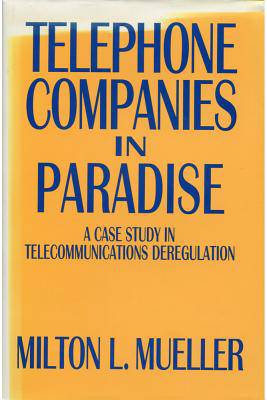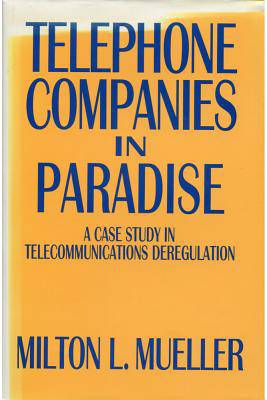
Bedankt voor het vertrouwen het afgelopen jaar! Om jou te bedanken bieden we GRATIS verzending (in België) aan op alles gedurende de hele maand januari.
- Afhalen na 1 uur in een winkel met voorraad
- In januari gratis thuislevering in België
- Ruim aanbod met 7 miljoen producten
Bedankt voor het vertrouwen het afgelopen jaar! Om jou te bedanken bieden we GRATIS verzending (in België) aan op alles gedurende de hele maand januari.
- Afhalen na 1 uur in een winkel met voorraad
- In januari gratis thuislevering in België
- Ruim aanbod met 7 miljoen producten
Zoeken
Telephone Companies in Paradise
A Case Study in Telecommunications Deregulation
Milton L Mueller
Hardcover | Engels
€ 121,95
+ 243 punten
Omschrijving
Computerization has generated dra-matic advances In telecommunica-tions, such as mobile telephones and video conferencing. Coupled with this are major changes in regulation, as telephone companies face new compet-itors. States are experimenting with new forms of utility regulation and de-regulation in order to cope with the demands of rising competition. Here Mueller examines in detail the results of a radical telephone regulation law.In 1986, the state of Nebraska com-pletely discarded traditional utility reg-ulation, deregulating rates and profits of its local telephone companies. The Nebraska experiment has become a benchmark for reassessing the role of state regulation In the future of tele-communications. Using comparative data from five midwestern states, Mueller shows how deregulation af-fected rates, investment, infrastruc-ture modernization, and profits. He uncovers both positive and negative results. Mueller found established telephone companies to be basically conservative, not aggressive and ex-pansionist, and concludes that new competition, not regulation or deregu-lation, is transforming the telecommu-nications industry.This book is the first systematic em-pirical study of the controversial Ne-braska law and its broader effects. It will be a significant addition to the much debated issue of telecommuni-cations deregulation. Economists, pol-icymakers, and telecommunications managers will find in this volume a substantial resource. According to Robert Atkinson, senior vice president of Teleport Communications Group: "Nebraska's experiences with telecom-munications deregulation - the good, the bad and the ugly - need to be un-derstood by all telecommunications policymakers across the country so that they can emulate Nebraska's suc-cesses and avoid its mistakes. Mueller provides the roadmap."
Specificaties
Betrokkenen
- Auteur(s):
- Uitgeverij:
Inhoud
- Aantal bladzijden:
- 198
- Taal:
- Engels
Eigenschappen
- Productcode (EAN):
- 9781560001034
- Verschijningsdatum:
- 31/12/1993
- Uitvoering:
- Hardcover
- Formaat:
- Genaaid
- Afmetingen:
- 152 mm x 229 mm
- Gewicht:
- 521 g

Alleen bij Standaard Boekhandel
+ 243 punten op je klantenkaart van Standaard Boekhandel
Beoordelingen
We publiceren alleen reviews die voldoen aan de voorwaarden voor reviews. Bekijk onze voorwaarden voor reviews.









